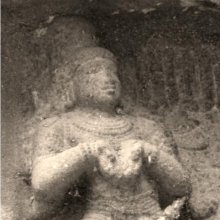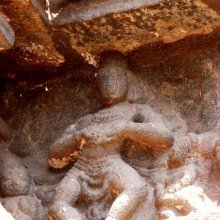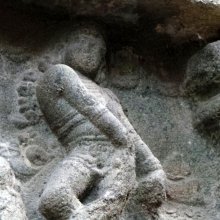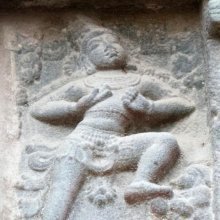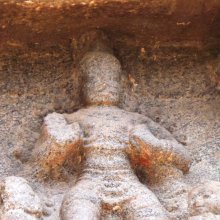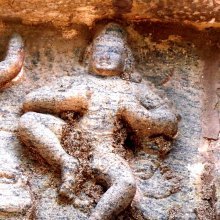Abhinavagupta, Abhinava-gupta: 7 definitions
Introduction:
Abhinavagupta means something in Hinduism, Sanskrit. If you want to know the exact meaning, history, etymology or English translation of this term then check out the descriptions on this page. Add your comment or reference to a book if you want to contribute to this summary article.
Abhinavagupta has 5 English definitions available.
Images (photo gallery)
(+9 more images available)
Languages of India and abroad
Sanskrit dictionary
[Deutsch Wörterbuch]
Source: Cologne Digital Sanskrit Dictionaries: Böhtlingk and Roth Grosses Petersburger WörterbuchAbhinavagupta (अभिनवगुप्त):—m. Nomen proprium eines Autors [HALL 163. 196. 199.] [Oxforder Handschriften 108,a,19. 113,b,12. 123,b,15. 199,b, No. 471. 212,a, No. 500. 238,a, No. 575.b,33. 246,b, No. 622. 255,b, Nalopākhyāna 5. 258,b,31] und [Nalopākhyāna 8.] [WILSON, Sel. Works 1,29.] [Sāhityadarpana 141,2.]
Source: Cologne Digital Sanskrit Dictionaries: Sanskrit-Wörterbuch in kürzerer FassungAbhinavagupta (अभिनवगुप्त):—m. Nomen proprium eines Autors.
Sanskrit, also spelled संस्कृतम् (saṃskṛtam), is an ancient language of India commonly seen as the grandmother of the Indo-European language family (even English!). Closely allied with Prakrit and Pali, Sanskrit is more exhaustive in both grammar and terms and has the most extensive collection of literature in the world, greatly surpassing its sister-languages Greek and Latin.
See also (Relevant definitions)
Partial matches: Gupta, Abhinava.
Full-text (+366): Shaktabhashya, Spanda, Kshemaraja, Kavyalokalocana, Gudajihvika, Tantraloka, Bharatatika, Tauta, Bhairavastava, Paratrimshika, Paramarthasamgraha, Bodhapancadashika, Dehasthadevatacakrastotra, Samkshepavimarshadhiroha, Tantralokasara, Guhyayoginitantra, Mukutasamhita, Cukhala, Dharmottama, Triratnakula.
Relevant text
Search found 37 books and stories containing Abhinavagupta, Abhinava-gupta; (plurals include: Abhinavaguptas, guptas). You can also click to the full overview containing English textual excerpts. Below are direct links for the most relevant articles:
Bhagavatpadabhyudaya by Lakshmana Suri (study) (by Lathika M. P.)
Śaṅkara affected by the disease Bhagandara < [Chapter 4 - Similarities and Dissimilarities]
Dasarupaka (critical study) (by Anuru Ranjan Mishra)
Introduction to the Nāṭaka type of Drama < [Chapter 1 - Nāṭaka (critical study)]
Introduction to the Ḍima type of Drama < [Chapter 4 - Ḍima (critical study)]
Introduction to the Prahasana type of Drama < [Chapter 3 - Prahasana (critical study)]
The Concept of Sahrdaya < [January – March, 2008]
The Concept of Dhvani in Sanskrit < [January – March, 1994]
Traditional Values in Art and Literature < [Jul–Sept 1971]
Gati in Theory and Practice (by Dr. Sujatha Mohan)
Analysis of technical terms: Tāṇḍava and Lāsya < [Chapter 1 - Nāṭya]
Literary and dramatic elements in Nāṭyaśāstra < [Chapter 1 - Nāṭya]
Introduction to the Nāṭyaśāstra < [Chapter 1 - Nāṭya]
Gitartha Samgraha (critical Study) (by Partha Sarathi Sil)
1. Significance of the Saṅgraha ślokas of the Gītārthasaṅgraha < [Chapter 4 - Critical Study of the Gītārthasaṅgraha]
1. Abhinavagupta and his works < [Chapter 2 - Abhinavagupta and the Gītārthasaṅgraha]
3. The Tradition of Commentaries on Bhagavadgītā in Kashmir < [Chapter 1 - A Brief Sketch of the Bhagavadgītā]
The Sarva-Darsana-Samgraha (by E. B. Cowell)
Related products
